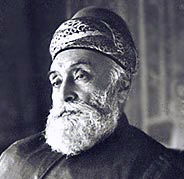Jamshedji Tata
Jamsetji Nasarwanji Tata | |
|---|---|
 Jamsetji Tata | |
| Born | 3 March 1839 |
| Died | 19 May 1904 (aged 65) |
| Alma mater | University of Bombay |
| Occupation | Founder of Tata Group |
| Spouse | Hirabai Daboo |
| Parent(s) | Nusserwanji and Jeevanbai Tata |
Jamsetji Nusserwanji Tata (Gujarati: જમ્શેત્જી નુંસ્સેર્વાનજી ટાટા; 3 March 1839 – 19 May 1904) was an Indian pioneer industrialist, who founded the Tata Group, India's biggest conglomerate company. He was born to a Parsi Zoroastrian family in Navsari then part of the princely state of Baroda.
He founded what would later become the Tata Group of companies. Jamsetji Tata is regarded as the legendary "Father of Indian Industry".[1]
- "When you have to give the lead in action, in ideas — a lead which does not fit in with the very climate of opinion — that is true courage, physical or mental or spiritual, call it what you like, and it is this type of courage and vision that Jamsetji Tata showed. It is right that we should honour his memory and remember him as one of the big founders of modern India."— Jawaharlal Nehru[2]
Early life
Jamsetji Tata was born to Nusserwanji and Jeevanbai Tata on 3 March 1839 in Navsari, a small town in South Gujarat. Tata was the first businessman in a family of Parsi Zoroastrian priests. It was only natural that Nusserwanji, would, as usual join the family priesthood, but the enterprising youngster broke the tradition to become the first member of the family to try his hand at business. He started trading in Bombay.
Jamsetji joined his father in Mumbai at the age of 14 and enrolled at the Elphinstone College completing his education as a ‘Green Scholar’ (equivalent of today’s graduate). He was married to Hirabai Daboo[3] while he was still a student.[4] He graduated from college in 1858 and joined his father's trading firm. It was a turbulent time to step into business as the Indian Rebellion of 1857 had just been suppressed by the British government.
Jamsetji's knowledge expansion happened through successive trips abroad, mainly to England, America, continental Europe, and other places that convinced him that there was tremendous scope for Indian companies to forge through and make a foray in the British dominated textile industry.
Business

Jamsetji worked in his father's company until he was 29. He founded a trading company in 1868 with Rs. 21,000 capital. He bought a bankrupt oil mill at Chinchpokli in 1869 and converted it to a cotton mill, which he renamed Alexandra Mill. He sold the mill two years later for a profit. He set up another cotton mill at Nagpur in 1874, which he christened Empress Mill when Queen Victoria was proclaimed Empress of India on 1 January 1877.
He devoted his life to four goals: setting up an iron and steel company, a world-class learning institution, a unique hotel and a hydro-electric plant. Only the hotel became a reality during his lifetime, with the inauguration of the Taj Mahal Hotel at Colaba waterfront in Bombay (now Mumbai) on 3 December 1903[5] at the cost of 42 million rupees (about 11 billion or 1100 crore rupees at 2010 prices). At that time it was the only hotel in India to have electricity.
His successors' work led to the three remaining ideas being achieved:
- Tata Steel (formerly TISCO - Tata Iron and Steel Company Limited) is Asia's first and India's largest steel company. It became world's fifth largest steel company, after it acquired Corus Group producing 28 million tonnes of steel annually.[6]
- Indian Institute of Science, Bangalore, the pre-eminent Indian institution for research and education in Science and Engineering.
- Tata Hydroelectric Power Supply Company, renamed Tata Power Company Limited, currently India's largest private electricity company with an installed generation capacity of over 8000MW.
Personal life
Jamsetji Tata married Hirabai Daboo. Their sons, Dorabji Tata and Ratanji Tata, succeeded Jamsetji as the chairman of the Tata group.
Death
While on a business trip in Germany in 1904, Tata became seriously ill. He died in Nauheim[7] on May 19, 1904, and was buried in a Parsi cemetery in Woking, England. .
Legacy
A pioneer, a visionary, a seer - perhaps these adjectives are not enough to describe a man of such extraordinary caliber and stature who has secured a strong foothold in the map of industrialized nations of the world. The creative forces of his genius were harnessed to cater to the development of his own land and his dreams arising out of intense love of humanity. The same passion, ideals and vision went a long way in shaping an outstanding business conglomerate that, ever since, has been constantly nourished and nurtured to offer credence to this one man’s novel dream, dreamt more than a century ago.
The repression of the Indians in the hands of British rulers coupled with widespread poverty all across the nation at that time, was at the root of this entrepreneur’s philosophy. This is what precisely set the stage for the Enterprise to plough back profits into various social-development initiatives – a direct fallout of the empathy set in the founder’s philosophy of business.
The humanitarian, charitable and humble principles that the industrialist followed made him believe that it was essential to nurture the fine brains of Indians in order to bring them out from the puddle of poverty and become self-sufficient. Jamsetji could never make his heart believe in hands on charity. Therefore, he established the JN Tata Endowment in 1892 that helped Indian students to pursue higher studies abroad. One such success was followed by another and yet another until such a time when two out of every five Indians coming into the elite Indian Civil Service were Tata scholars.
The Taj Mahal Hotel is believed to have held a special corner in the entrepreneur’s heart.
By the time the Taj Mahal Hotel was completed in 1903, it was the finest luxury hotel and the first building in India that used electricity. Endorsed with supreme luxury items from across the globe, Taj Mahal Hotel boasted American fans, German elevators, Turkish baths, English butlers and whole lot of other innovative delights that the Indians were deprived of.
With the establishment of his steel plant, he made a quantum shift in the nature of his business. From a country of petty traders, British India stepped into a world of industrialization, marking the glorious chapter of a new era.
The cotton mills and other companies started by Jamsetji Tata came to be known as the Tata Group, today the largest private sector business house in India.
City named after him
Tata's iron and steel plant was set up at Sakchi village in Bihar. The village grew into a town and the railway station there was named Tatanagar. Now it is a bustling metropolis known as Jamshedpur in Jharkhand, named in honor of the Jamshetji.
The old village of Sakchi (now urbanized) still exists within the city of Jamshedpur, as its suburb.
Quotes
"Freedom without the strength to support it and, if need be, defend it, would be a cruel delusion. And the strength to defend freedom can itself only come from widespread industrialisation and the infusion of modern science and technology into the country's economic life."
"There is one kind of charity common enough among us… It is that patchwork philanthropy which clothes the ragged, feeds the poor, and heals the sick. I am far from decrying the noble spirit which seeks to help a poor or suffering fellow being… [However] what advances a nation or a community is not so much to prop up its weakest and most helpless members, but to lift up the best and the most gifted, so as to make them of the greatest service to the country."
"Be sure to lay wide streets planted with shady trees, every other of a quick-growing variety. Be sure that there is plenty of space for lawns and gardens. Reserve large areas for football, hockey and parks. Earmark areas for Hindu temples, Mohammedan mosques and Christian churches." — Jamsetji Tata in a letter to son Dorab about his vision for the township that would eventually become Jamshedpur.
"He was not a man who cared to bask in the public eye. He disliked public gatherings, he did not care for making speeches, his sturdy strength of character prevented from fawning on any man, however great, for he himself was great in his own way, greater than most people realised. He sought no honour and he claimed no privilege, but the advancement of India and her myriad peoples was with him an abiding passion." — The Times of India on Jamsetji Tata's death
"While many others worked on loosening the chains of slavery and hastening the march towards the dawn of freedom, Jamsetji dreamed of and worked for life as it was to be fashioned after liberation. Most of the others worked for freedom from a bad life of servitude; Jamsetji worked for freedom for fashioning a better life of economic independence." — Dr Zakir Hussain, the former president of India
"That he was a man of destiny is clear. It would seem, indeed, as if the hour of his birth, his life, his talents, his actions, the chain of events which he set in motion or influenced, and the services he rendered to his country and to his people, were all pre-destined as part of the greater destiny of India." — JRD Tata
"No Indian of the present generation had done more for the commerce and industry of India." — Lord Curzon, the viceroy of India, following Jamsetji Tata's demise [2]
Biography
- For the Love of India: The Life and Times of Jamsetji Tata by R M Lala (ISBN 0-670-05782-7)
References
- ^ JAMSHEDJI TATA Founder of TATA Industries
- ^ a b About us | Heritage | Pioneers. Tata.com (2008-08-10). Retrieved on 2013-07-28.
- ^ "Family Tree of the Tatas". Retrieved September 9, 2006.
- ^ "Biography on [[TIFR]] website". Retrieved September 9, 2006.
{{cite web}}: URL–wikilink conflict (help) - ^ "Taj Hotels website".
- ^ "Tata Steel website". Retrieved September 9, 2006.
- ^ Jamsetji Tata’s guiding spirit- growth of Indian Steel industry by Tata legacy. Tatasteel100.com. Retrieved on 2013-07-28.
- EPW at www.epw.org.in Jamsetji Nusserwanji Tata, A Centenary Tribute

